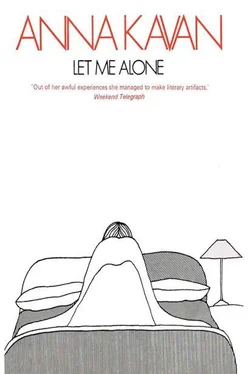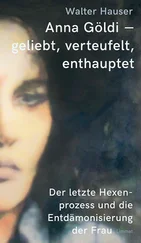A peculiar light flashed in Lauretta’s eyes. Her whole face assumed a secret and somewhat blenched expression, a sly look of wicked, secret cunning and knowingness, like an evil little bird.
‘I’m beginning to think that Haddenham was not a very desirable place. It seems to have had a remarkably bad effect upon you.’
Anna felt herself beginning to tremble inwardly. An irritable disgust had fallen upon her, so that she wanted to make some violent gesture, to smash something, and to run out of the room. But outwardly she remained perfectly calm.
‘I don’t know what you mean,’ she said.
‘I hope for your sake that is true; that you don’t understand me.’
It was perfectly clear that Lauretta was enjoying herself. She rejoiced because she had been able to bring that pale, disgusted look to Anna’s face. Her eyes were bright points of malice in her soft face.
‘But, anyhow, your friendship with this Sidney must stop. It’s unhealthy, and I won’t allow it to continue.’
‘Unhealthy!’ cried Anna, in a voice quivering with anger. ‘Sidney’s the healthiest person alive!’
Lauretta gave a little triumphant smirk. Her desire to wound and insult Anna was gratified. She had touched her on the raw.
‘I think not,’ she said. ‘This is an unhealthy letter. It is not at all a normal, harmless letter from one girl to another. It’s a love letter, neither more nor less!’
Sitting up against her pillows she was staring at Anna with a sharp, evil enjoyment of knowledge, like a bird that had just picked a tasty morsel out of the dust-bin. Anna shrank from the bright, detestable knowingness of her gaze. She resented it furiously. And yet she had to stand quietly beside the bed. And still Lauretta stared at her, with the sharp, unspeakable look of secret evil knowledge, that seemed to smear her heart. She looked aside at the window, which had a patterned chintz blind. A quivering blankness had come upon her, as though she were going out of her mind.
‘You will not write to her, or receive any more letters from her,’ Lauretta said.
Anna could hear the insolent satisfaction in the voice, the vicious delight in hurting and humiliating. She did not turn to her at once. It was horrible to her to see the slightly sagging face, on which was a tormenting, ugly look. She hated to see the cruel smirk of triumph on the relaxed mouth. And the bright eyes watching her like a wicked, predatory bird, with a sly gleam of ferocity, sinister.
Anna went to her own room — sat there silent, trembling, with the ugly smear on her heart, and a numbness also: she who was so independent and so strong.
She knew the sneaking, covert horror which is the world’s horror of evil. She knew that Lauretta had stabbed a venomous point of knowledge into her soul.
And she had lost Sidney. The loneliness of being cut off from Sidney, the blank loneliness of isolation in a hostile camp; the self-reproach, the regret; the reproach of Sidney’s faithful, amber-coloured eyes, hurt and loyal and bewildered, left without explanation!
Anna was bitterly defiant under her stubborn calmness. Only she knew that it was useless to fight against Lauretta. Lauretta had her in her power, utterly. She was forced to submit. But underneath surged such a tide of bitterness and revolt that she felt her heart almost burst.
‘I shall never forgive her,’ she said to herself, looking at Lauretta in her hard way, with a distraught, inward shudder of too-much enmity.
It was not only the loss of Sidney that she had suffered at her hands. It was some sort of horror that Lauretta had inflicted upon her. The loathsome, creeping horror of the world’s evil. For the poisonous point of evil-knowledge had really stabbed her to the heart. There was a horrible smear now, unalterable, upon her heart. And an uncertainty, a nightmare creeping back into her life. Her self-confidence had been undermined.
When she spoke to Lauretta there was a new reserve in her cool voice, the reservation of sheer enmity.
Lauretta herself didn’t care a bit that she had done these things to Anna. She felt no responsibility. She was rather disappointed that Anna was not more obviously distressed by the loss of her friend.
‘I don’t believe she really cared for the girl at all,’ she thought. ‘She seems incapable of any feeling whatever.’ At which her indignation and resentment increased.
The life of Blue Hills ran on. But for Anna it had lost all interest and reality. She was waiting now, just waiting to get away. Waiting for her real life to begin. She was conscious all the time of a sense of impermanence. And the three of them, herself and Lauretta and Heyward Bland, were no more than spectres moving in the house, until such time as she could make her escape.
‘Oxford. Oxford,’ she said to herself, thinking of the autumn. The summer, the present, was no more. Blank and restless she waited for the days to pass, like someone on the eve of a long voyage.
Drummond, the Oxford publisher, was taking an interest in Anna. He had written to her once or twice about her poems. He seemed to think they had merit in them. Then for a long time she heard nothing more. It looked as if she had been forgotten. But the manuscripts were not returned: she persuaded herself that this was a good sign.
Suddenly a letter came. Drummond wanted to see her, to talk to her. In a drift of hidden excitement she started for Oxford. She would not let anyone see her excitement. Instead, she went in an off-hand way, deliberately casual, albeit somewhat unnatural. There was an eager, intent look at the back of her eyes, a look of concentrated anxiety. She did not know it was there. But she was aware that much more than the personal literary issue was at stake.
Drummond received her in his private room. She was not quite at ease with him. She felt that he was supercilious. He was a man of about thirty, bright-eyed, and rather suavely dressed, with nimble, restless hands that seemed always on the move. He was very polite, talking a good deal in his careful, demure voice. It was his voice that made Anna uneasy. She seemed to hear in it a note of arrogance, of soft, haughty superiority. As though he had superior blood in his veins, and was slightly contemptuous, and would never, never admit anyone to equality with him.
All the same, she found him quite attractive. The two of them sat together in the little room which had a tiny balcony hanging over the street. They talked for some time and laughed often. But Anna began to wonder when he would mention her work. It was a mystery why he should find so much to say to her. And in the light from the window she saw his very bright eyes gleaming upon her, and his nostrils slightly dilating, almost as though he wanted to make love to her: although they were strangers to one another. His hands were never still.
‘Why do you want to write poetry?’ he asked.
He also seemed suddenly to realize that they were strangers.
‘I don’t know,’ she said, somehow disappointed.
Drummond seemed to be looking at her with a certain faint derision. She didn’t like the thin line of his mouth with its hint of inevitable superciliousness.
‘I want to write. To earn my own living,’ she said, feeling empty and astray, as if she had received a rebuff.
‘You won’t need to do that,’ he answered, with a smile that might have meant she was making a fool of herself, and the faint suggestion of arrogance, which embarrassed her slightly.
She knew then that he would not publish the verses. There was no definite shock of disappointment. To tell the truth, Anna herself had never quite expected him to do so. But she was deeply, emotionally distressed, nevertheless.
‘They are very good,’ young Drummond told her with suave politeness. ‘Very good, but not quite good enough. A little immature, perhaps. It would not really be fair to you to publish them. You are so very young.’
Читать дальше












